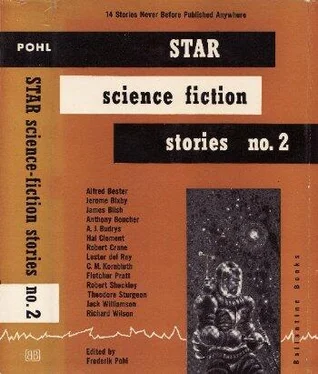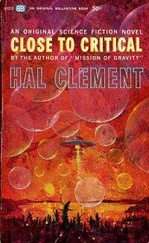Hal Clement - Critical Factor
Здесь есть возможность читать онлайн «Hal Clement - Critical Factor» весь текст электронной книги совершенно бесплатно (целиком полную версию без сокращений). В некоторых случаях можно слушать аудио, скачать через торрент в формате fb2 и присутствует краткое содержание. Год выпуска: 1953, Издательство: Ballantine Books, Жанр: Фантастика и фэнтези, на английском языке. Описание произведения, (предисловие) а так же отзывы посетителей доступны на портале библиотеки ЛибКат.
- Название:Critical Factor
- Автор:
- Издательство:Ballantine Books
- Жанр:
- Год:1953
- ISBN:нет данных
- Рейтинг книги:4 / 5. Голосов: 1
-
Избранное:Добавить в избранное
- Отзывы:
-
Ваша оценка:
- 80
- 1
- 2
- 3
- 4
- 5
Critical Factor: краткое содержание, описание и аннотация
Предлагаем к чтению аннотацию, описание, краткое содержание или предисловие (зависит от того, что написал сам автор книги «Critical Factor»). Если вы не нашли необходимую информацию о книге — напишите в комментариях, мы постараемся отыскать её.
Critical Factor — читать онлайн бесплатно полную книгу (весь текст) целиком
Ниже представлен текст книги, разбитый по страницам. Система сохранения места последней прочитанной страницы, позволяет с удобством читать онлайн бесплатно книгу «Critical Factor», без необходимости каждый раз заново искать на чём Вы остановились. Поставьте закладку, и сможете в любой момент перейти на страницу, на которой закончили чтение.
Интервал:
Закладка:
There was no magma pool near enough to be “tickled” into action this time; but that did not bother Derrell. He had already seen what molten rock would do in this situation. He rapidly gave orders, and the group of liquid bodies gathered in the limestone just above the bubble and began to—eat. The eating was done in a very careful manner; and gradually a large fragment of limestone was separated from the rest of the formation. It was located directly above the bubble, and when freed from its original matrix rested on the thin silicate layer that formed the roof of the cavity. That layer was seamed with cracks, microscopic in size, but adequate to the needs of the scientists; their fluid bodies worked inside those cracks, loosening particle after particle, gradually weakening the flimsy roof. The actual force that any one of the beings could exert was minute, lifting a grain of sand would have been impossible for one of the big, but fluid, bodies; but bit by bit the lava moved, as it was dissolved along the tiny zones of weakness the brief exposure to the sea had left.
Toward the end the workers very carefully stayed away from the thin layer, extending only narrow pseudopods to do the remainder of the job. Most of them, in fact, withdrew even farther in order to observe, and two of the assistants completed the final task. Derrell was ready when the lava roof suddenly collapsed, permitting the great block of limestone they had previously freed to drop into the cavern.
No one was very surprised. It behaved, within its limitations, as the magma had done, hurtling against the wall farthest from the Void, and sending a few fragments of its’ mass flying off at angles. The fragments also returned to that part of the vast cavity farthest from the broken roof. The force evidently existed; and it appeared to work on solids as well as liquids. Bits of the lava roof had also obeyed the invisible urge; and as far as any one could tell, not a single fragment that was free to move away from the Void had failed to do so.
Without a word, Derrell flowed through the limestone to a point just above the opening. Here he pulled himself into the smallest possible volume, and deliberately began to dissolve the rock about him. He had tried to get to the portion of the bubble where the rocks had come to rest, and found it impossible; the tiny cracks that would have furnished access extended only a foot or two from the surface of the lava. Now he was going to get there—and incidentally, see what effect the new force had on living matter. He learned!
The rock in which he lay broke free as its predecessor had done; and Derrell became the first member of his race to experience the acceleration of gravity. He also was the first to discover that the most noticeable thing about a fall is the sudden stop. The shock did not hurt him—after all, he was accustomed to traveling in regions of seismic strain, and seeing by the resultant shock waves—but the whole thing was slightly surprising. For one thing, the rock had turned over as it fell, and no member of his race had ever had a sudden change of orientation with respect to his surroundings. It took several seconds for him to realize that it was he who had moved, not the surrounding universe.
Once convinced of that, he started to emerge from the rock which he had ridden; and in doing so he learned the most painful lesson of all about gravity.
Derrell’s body was liquid. It was less dense than water, being composed mainly of hydrocarbons; it had no more rigidity than water. All its support was normally furnished by the rock in which it happened to be “soaked” at the moment; he moved by controlling the liquid’s surface tension, as an amoeba moves—or, for that matter, as a man moves a muscle. Outside the supporting rock, however, he was just a puddle of oil—and once he started out, he was completely unable to stop. The block of limestone he had ridden was not quite at the bottom of the huge cavity; as a portion of his mass emerged, it tended to flow downhill toward the lowest available point; he had the choice of following it or being torn apart, and he liked the latter alternative no better than a more solid organism would. He followed. Five seconds later he was a completely helpless pool of living liquid, in the bottom of a bowl of glassy, impenetrable lava. He could not even raise a ripple on his own surface.
He could still communicate—that lava carried sound perfectly. However, he did not do so intelligently; all his students heard was a series of endlessly repeated warnings to keep clear of empty spaces—to avoid all dealings with the Force—to leave this neighborhood and to let him die, but be sure to carry the warning to the rest of the world—in short, little but hysteria. Had Derrell not been so upset, he would have seen the way out in a moment; but he can hardly be blamed for being perturbed. A man suddenly finding himself imbedded completely in a block of concrete, yet somehow still living and breathing and able to speak, might have had some inkling of the scientist’s emotions; but at least a man could vaguely imagine such a situation in advance. No member of Derrell’s race could have foreseen any detail of what had happened to him.
Fortunately, the students for the most part remained calm; and it was one of these who saw the solution. Derrell was restored to something like a state of reason when tiny pebbles of limestone began to fall near, and sometimes into his body. It was a long, long, job; but at last the dwellers of the rock completed the task which the ocean had failed to perform a hundred million years before, and the cavern was full of limestone. Even now travel was not easy—the space between particles was too large, and Derrell had acquired a strong antipathy to open spaces; but travel was at least possible, and at long last he found himself once more in habitable, negotiable, comfortable rock outside that terrible cavern. For a long time he rested; and when finally he spoke, it was with conviction.
“Whatever we may learn of that force in the future, certainly no one can ever doubt its reality. I hope none of you ever feel it. Those of you who were over that cave releasing rocks that enabled me to escape were taking a chance worse than that ever faced by soldier or explorer; believe me when I say I am grateful.
“One point we have learned, besides the mere existence of the force: it is not always perpendicular to the Void boundary.” A faint flicker of surprise manifested itself among the listeners, but stilled at once as they perceived that the scientist was right—the boundary was extremely irregular where it passed nearest this region; projections of rock reached out into the Void at frequent intervals sometimes for more than a mile. There was no single direction that could be said to be perpendicular to it.
“That leaves two principal possibilities. One is that the force is directed at least somewhat at random, and the ocean has collected in specific localities because of that fact. If that is so, then the Pentong project is useless; the new ocean will simply add to the old, and cover no more Earth. The other main possibility would seem to be that the force does not extend into the Void at all; and in that case we have no idea at all what will happen, except that the magma we bring up will probably spread over the boundary as it always has. We cannot even guess what the melted ocean will do.
“It seems to me a very ill-advised plan, to divert as much effort as this project would demand from our defense, when we cannot even be moderately sure of success. I think I will go to the nearest city to express my opinion—there is still too much risk from the tribes of Asia to take any chances. Has anyone a different opinion, or a better plan?”
“One thing might be done first.” It was Taless, one of most self-confident of the group. “It seems almost as bad to halt the project for ignorance as to waste effort from the same cause. I would strongly recommend that we learn something about the force beyond the boundary before we express opinions to any City Leaders. At the most, let us advise delaying, not canceling, the project until some data on that matter can be obtained.”
Читать дальшеИнтервал:
Закладка:
Похожие книги на «Critical Factor»
Представляем Вашему вниманию похожие книги на «Critical Factor» списком для выбора. Мы отобрали схожую по названию и смыслу литературу в надежде предоставить читателям больше вариантов отыскать новые, интересные, ещё непрочитанные произведения.
Обсуждение, отзывы о книге «Critical Factor» и просто собственные мнения читателей. Оставьте ваши комментарии, напишите, что Вы думаете о произведении, его смысле или главных героях. Укажите что конкретно понравилось, а что нет, и почему Вы так считаете.












